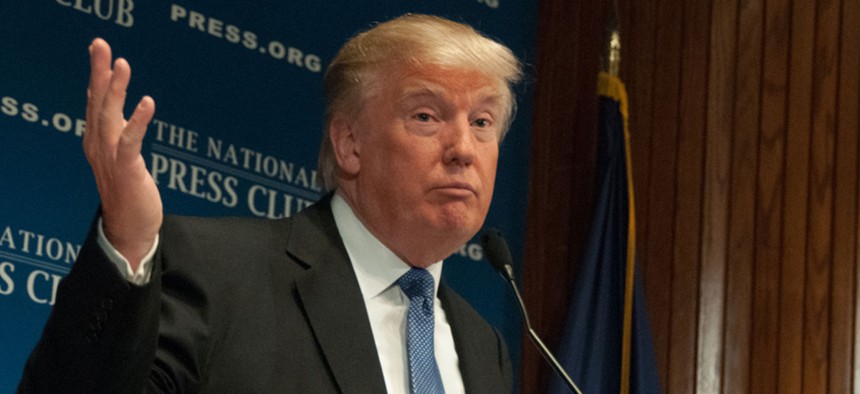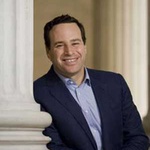The Kasich Campaign Releases Trump Attack Ads
The Republican frontrunner has surged in the polls by taking a tough stance on immigration—and if critics want to stop him, that’s what they need to attack.
A new round of attack ads are heading Donald Trump’s way, some from John Kasich’s campaign and the super PAC backing him, and more in the future from an LLC created specifically to produce anti-Trump messages.
New Day for America’s 47-second ad splices together some of the Republican front-runner’s most awkward video moments: his suggestion he might date his daughter, his claim of “a great relationship with the blacks.” The Kasich campaign’s ad turns Dietrich Bonhoeffer’s famous words “nobody left to speak for me” into a warning from one of John McCain’s fellow Hanoi Hilton POWs that a Trump presidency is a threat to freedom. John Kasich’s Twitter account has fired direct personal challenges to the famously thin-skinned mogul.
A bully never expects anyone to fight back. And tonight you saw what happens when we did. See you on the trail, Mr. Trump.
— John Kasich (@JohnKasich) November 24, 2015The anti-Trump LLC hasn’t produced a video yet, but an email from its president Liz Mair (a friend of mine) gives a hint of the approach it will take.
“I was unaware that a six year-old crybaby with his training pants in a bunch was running for President using the name ‘Donald J. Trump.’ The good news is, now we can all plan accordingly and ensure that if he wins, the White House is loaded up with juice boxes, he’s afforded time for his afternoon nap so he doesn’t get cranky, the President gives the State of the Union from the bouncy castle at Chuck-E-Cheese, and the Oval Office is stocked with Smurf toys for him to yell at when Vladimir Putin treats him unfairly,” she told Truth Revolt in an email.
Thus far, these productions seem intended only for an audience of political insiders to watch on YouTube or discuss on Twitter. Which is just as well. Authentic as their sentiments may be, these attacks will bounce off for much the same reasons that a previous round mocking Trump as an unfit commander in chief—fired off by the Jeb Bush campaign—failed to have an impact.
The goal of convincing a Republican primary electorate that Trump is personally unequal to the job of president is unlikely to succeed. They’ve seen Donald Trump dominating and commanding all the other Republican presidential candidates (except Carly Fiorina) in one-on-one personal confrontations on the debating platform. They know, or think they know, that Donald Trump built a gigantic business empire. They have watched as a network “reality” television show portrayed him over 14 seasons as America’s supreme problem-solver and team leader. Now the same party leaders who insisted that Sarah Palin could do the job of president, if need be, want to persuade the rank-and-file that Trump can’t? Good luck with that.
Attacking Trump on national-security grounds will be especially challenging. Many Republicans see immigration as itself a national-security issue, arguably the paramount national-security issue. The Washington Post recently published asurvey of GOP and GOP-leaning opinion on the Syrian refugee issue:
Nearly half of GOP-leaning respondents in the poll — 47 percent — both support the deportation of undocumented immigrants and oppose accepting refugees from Syria and other Mideast conflicts. If a GOP-leaning voter supports deportation, there is a 79 percent chance she or he also opposes Syrian refugees, compared with 54 percent if they oppose deportation.
Trump has captured the support of 51 percent of those overlapping voters, compared with 16 percent among all other Republican voters. Put another way, pro-deportation/anti-refugee voters account for almost three-quarters of Trump's support.
When a Jeb Bush, John Kasich, Chris Christie, or Marco Rubio attacks Donald Trump as an unfit commander in chief because of this wild statement or that (and Trump’s statements can be plenty wild!), they miss the point. Reckless talk about the Iran nuclear deal, or the war in Syria, or the Russian assault on Ukraine may trouble voters—but the deal is made or unmade on a candidates’s credibility on border security. On that issue, the elected-office Republicans have all crowded together where the party isn’t, and Trump alone dominates the ground where the party is. He is the one positioned to attack them as naive and weak, not the other way around.
And how about the suggestion that Trump is a fascist dictator in the making? Good luck with that, too. Yes, over the past week, Donald Trump has wandered into territory where democratic politicians do not go. Jeb Bush and John Kasich have spoken up—a show of courage and character that should redound to their credit. Yet if there is one concept that conservative media have tried to pound into the heads of their listeners and readers, it is that fascism is always and everywhere a left-wing phenomenon. By definition, therefore, Trump can’t be a fascist—and anybody who says otherwise is probably a covert liberal himself or herself.
No, if you want to take down Trump, there is only one line of attack that will work—but it is an attack that requires the party leadership and its donors to attain some critical distance from their own beliefs and points of view.
Right now, construction crews are at work completing the new Trump hotel in Washington D.C.’s Old Post Office. In July, a reporter for the Post interviewed 15 of those workers.
[M]any of them had crossed the U.S-Mexico border illegally before they eventually settled in the Washington region to build new lives.
Several of the men, who hail mostly from El Salvador, Honduras and Guatemala, have earned U.S. citizenship or legal status through immigration programs targeting Central Americans fleeing civil wars or natural disasters. Others quietly acknowledged that they remain in the country illegally.
A spokesman for the Trump organization noted that construction workers on the site were employed not by Trump himself, but by subcontractors. That answer may constitute a valid legal defense—but it’s no defense at all for attack ad purposes.
Extreme and provocative statements verging on open racism normally doom candidates. They have helped Trump, to date, because those statements seemed to prove that here, at last, was a candidate as exercised about the immigration issue as Republican voters. The well-spoken politicians who had promised to solve the problem in years past had all failed, or turned coat. But a man who’d say wild things that the political elite unanimously condemned as reckless and irresponsible—well, he at least must be sincere, mustn’t he?
So that’s the point where an effective attack would hit him.
Until he read Ann Coulter’s book this spring, Trump seemed to have been a perfectly conventional business Republican on immigration. In a 2012 interview,in fact, he blamed Romney’s loss on taking a too-tough line on the issue:
“The Democrats didn’t have a policy for dealing with illegal immigrants, but what they did have going for them is they weren’t mean-spirited about it. They didn’t know what the policy was, but what they were is they were kind.”
Romney’s solution of “self deportation” for illegal aliens made no sense and suggested that Republicans do not care about Hispanics in general, Trump says.
“He had a crazy policy of self deportation which was maniacal,” Trump says. “It sounded as bad as it was, and he lost all of the Latino vote,” Trump notes. “He lost the Asian vote. He lost everybody who is inspired to come into this country.”
The GOP has to develop a comprehensive policy “to take care of this incredible problem that we have with respect to immigration, with respect to people wanting to be wonderful productive citizens of this country,” Trump says.
If Trump said those things in one interview, recorded only in print, it’s likely he said them in others, recorded in video and audio, the raw material of the attack ad. Where he is in 2015 is not where he was in 2012—and that could suggest that where he is in 2015 is not where he’ll be if elected president. Every politician changes his mind. Accusations of flip-flopping hurt because they open the possibility that where there is a flip-flop, there may in future be a flop-flip—that the position adopted for political advantage will be jettisoned when political advantage signals a different direction.
Trump’s histrionics—and the criticism he has taken—may seem the ultimate proof of sincerity: When a man walks that far onto a limb, he must mean it, right? The task for Trump’s Republican rivals is to convince Trump followers that this supposed anti-politician is using typical politician’s tricks.
Attacking Donald Trump as untrustworthy on stopping illegal immigration—or having super PACs do it —will stick in the craw of elected Republicans. They are, for the most part, in full agreement with the 2012-vintage Trump on the issue. But it’s their only hope. Of course, it raises the awkward but all-important question: What would they do instead to address a voter concern that until now they have ignored or disdained?
(Image via Albert H. Teich / Shutterstock.com )
NEXT STORY: Why Poor FITARA Grades Are a Good Start




